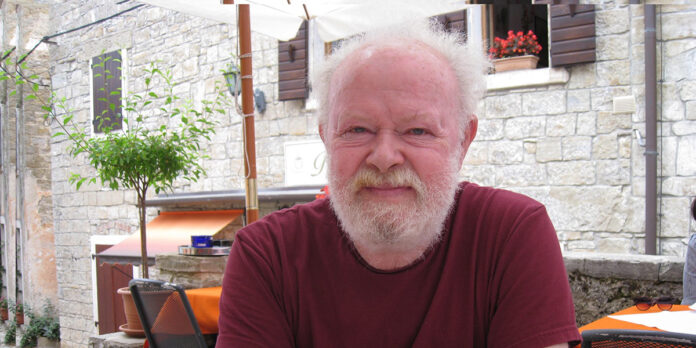Ciaran O’Driscoll has pleasant memories of time he spent in County Clare from visiting his parents at their home in Ballynacally, to his love of the concertina that brought him west from London to the Willie Clancy Summer School, where he attended the concertina weekend on many an occasion.
It is his love of words and storytelling, and his interest in passing on the knowledge he has amassed to a younger generation, that is the mark of the man.
“My mother and father lived in Ballynacally for about 20 years. My father thought Clare was the place to go because of the music,” he said.
“He played an accordion but wasn’t very good at it but he’d practise every night. He would practise into one or two o’clock in the morning and used to drive my poor mother mad. And when I was in London I used to go over for the Willie Clancy Week with a gang of people from London.
“I’m self taught on the concertina – I just enjoy playing it and hopefully I am a bit better than my father was.”
The author and poet has recently published his second novel book entitled The Golden Ass. A member of Aosdána since 2007, he has ten published collections and a volume of life-writing to his credit. His new short novel was published after he collaborated with a local publishing house.
Executive Editor of he Limerick Writers Centre, Dominic Taylor submitted The Golden Ass to the Booker Prize 2024 competition on Ciaran’s behalf, and it was accepted for consideration.
“I had entered it for the Booker Prize. Dominic Taylor sent my book and he qualified for the entry, and we were accepted. It was the first short novel the Limerick Writers’ Centre ever entered,” Ciaran explains.
Dominic Taylor feels that The Golden Ass qualifying for the entry is an achievement in itself because there are only 150 entries and it is a massive prize.
“Not all publishers can submit and there are massive criteria; it has to be a work of fiction, they have to be published in long form, they have to be recently published and also fall into the time-frame which Ciaran’s book did. Of course the long list would be the icing on the cake but even just being in there is wonderful,” Dominic says.
Ciaran’s involvement with the writer’s centre extends to judging, mentoring and nurturing new literary talent on the Gerard Griffin Competition.
Having previously played a part in the now defunct Cuisle Limerick International Poetry Festival with a number of prominent arts figures in the city, he has now come together with Dominic to organise a successful mentoring programme for young writers which is aimed at discovering and promoting new voices in Irish literature.
“It is called the Gerard Griffin Competition and 2024 was the first year of the adult fiction prize,” he said.
“So we select four people to do an intensive course of ten weeks from January to February and then they are left on their own to finish a novella of 25,000 words or so. A young woman from Cork called Freyja Hellebust has won it this year.”
Having recently celebrated his 81st birthday on October 2, he has been writing from an early age. At boarding school when he was about 16 years old, when he would finish his homework he would start writing poetry, and so began his love of the written word.
He had a late vocation and was in a religious order for about eight or nine years before leaving in his 30s. After leaving, he went to London where he taught in a Catholic school. He studied social philosophy in the University of London returning to Ireland with a Masters degree in the 1980s.
Whilst living in Cork, he got to know poets and writers through the lively arts scene there such as John Montague, Seán Lucy and Gerry Murphy; all of whom he cites as a great inspiration. And the writers he was reading in his 20s such as WB Yeats and TS Eliot have also never left him, and his first writings were all inspired by his admiration for the classical modernists.
“I am a die hard modernist so in poetry, it would mean not sticking to metres and using free verse and also irony. And with irony, testing feelings against irony is essential to see if they are real,” he said.
“The stuff we studied in school was a bit passée. As I remember we only ever studied one TS Eliot poem in secondary school and that was Journey of the Magi.”
As for The Golden Ass, he refers to it as a short novel joking it was submitted to the Booker Prize as a short novel but, “there’s a grey area between long novellas and short novels”. He describes the book as “a comedy with tragic overtones” but all’s well that ends well, in the end. One of the challenges he experiences as a writer is how to make the ending convincing rather than a Hollywood type ‘happy ever after’ ending.
“One of the things I try to do with it, and I thought on it rather than deal with it comprehensively, is that people who leave a religious order within ten years will suffer from Post Traumatic Stress Disorder (PTSD). I look back at it now I realise that I had PTSD and I had it for ten years. The church doesn’t want to recognise it,” he said.
“They sent me out with a ten shilling note in my back pocket.” We talk about how the Ireland of today is much secular in nature yet “there is a lot of religion still under the surface, or it is changing,” he says.
The brave and beautifully written novel centres about Martin, an Irishman teaching in Paris who takes a break from married life to try and deal with his sexual confusion and PTSD from leaving a religious order. He travels, guilt-ridden, from place to place until he arrives in Rome and meets Hilary, a rent boy in his mid-twenties whom he has a whirlwind affair with. Martin’s wife Sarah who sets out to find him in Italy has a fling with a Parisian work colleague called Ella, and then there is Christy, an Irish trad musician who meets Hilary in London.
The characters’ risqué and often scandalous actions eventually uncover a deep, underlying desire for a sense of belonging which is a return to the Ulyssean Ithaca, the mythical home that serves as the novel’s final word. The book explores sexuality as a spectrum, delves into human fantasy, questions the notions of beauty, traverses the effects of trauma as well as dealing with duty and responsibility.
“People ask me if it is autobiographical – of course it is fictional but I did spend a year at Umbria with my wife and child. The people running the place where we stayed were a homosexual couple and I got a lot of observations from talking to them…
“…The character Hilary is the main character. He is The Golden Ass which is a pun and also a reference to the only surviving novel in classical times. Martin is the Golden Ass in one sense and Hillary is The Golden Ass in another sense,” Ciaran explains.
His inspiration for the novel is derived from an ancient Roman text called The Transformation of Lucius (renamed The Golden Ass) and its theme of metamorphosis. The dark comedy explores the lives of various ‘in-betweeners’ who are those people navigating complex transitions, and he hopes the novel will resonate with a wide array of readers particularly anyone navigating transitional periods through challenging life changes, at whatever their life stage. Those changes can be a search for connectedness, openly embracing one’s identity or closeting true identity.
With the novel based in Rome, I ask if he visited the Eternal City to research the novel.
“I actually wrote a lot of it in Rome. I stayed in Rome in January and February of 2013. I wrote this Rome journal and I didn’t know the journal would be part of my main character until last year. I’ve been able to draw on the Rome diary for a description of places and streets,” he said.
“A considerable amount is set in Rome but also there is a London element in it. There’s a guy called Christy, an Irish tin-whistle player who used to be a builder labourer. He lives in a squat and gives tin whistle lessons.
“It is set somewhere in the recent past – somewhere in the 2010s. I tried to revive the idea of a tragic comedy. Traditional comedy used to deal with romance, and sexual energy gets people into romance, but this novel is on how traditional sexuality is more fluid now.
“Hopefully it will try to bridge a gap between the generations. I would hope I was doing that.”
Ciaran wrote The Golden Ass within a year. His first novel took 17 years on and off, but this one only took a year to write.
Initially, he was helped by an English poet he knew and had to decided to collaborate with but after a while, he decided to go his own way. Asked was he particularly proud of this novel, he says,
“I’m kind of proud of the fact I did it. I think I am scared of it as well. I lost a lot of sleep over it as well and for a while I thought has the auld religious guilt thing come back. I had to sort it for myself and get on with it but now that it is a done, it’s good to get away from it,” he said.
Aside from one review in the Sunday Independent, the overall feedback on the novel has been quite positive.
“I got a number of good unsolicited comments and got some reviews which were very positive on Facebook,” he said.
“Fred Johnston a writer from Belfast who lived in Galway and recently died wrote me a wonderful review on Facebook just days before he died.”
The Golden Ass is available at Ennis Book Shop, Banner Books at Ennistymon and Kilrush, and the Salmon Book Shop, Ennistymon
Sharon Dolan D’Arcy covers West Clare news. After completing a masters in journalism at University of Galway, Sharon worked as a court reporter at the Sligo Weekender. She was also editor of the Athenry News and Views.



